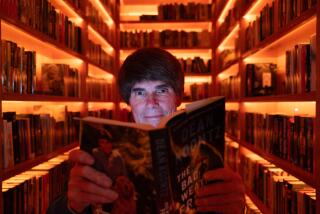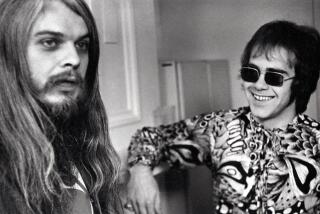Book Review : The Past Seen Through a Chinese Literary Lens
Remembrances. The Experience of the Past in Classical Chinese Literature by Stephen Owen (Harvard University Press: $17.50).
Below my window and 100 feet down Commonwealth Avenue, William Lloyd sits uncomfortably on his bronze chair and glares eastward toward Boston’s Public Gardens.
It is affecting. Why? One reason is whatever knowledge or feeling one has about what our premier Abolitionist actually did or was. Another is the intransigence that the sculptor has captured by making it so plain that Garrison would rather be doing anything than sitting down. It goes with the inscription on the side: “. . . I will not excuse. I will not retreat a single inch and I will be heard.”
But there is something more. It pertains to all statues, not only to this one, except that this one, being more individual than most, possesses it more strongly. Yes, the statue makes us think of the man. But what it does--specifically, by its actual, solid and, in a few cases, expressive presence--is tell us that the man is no longer here. A statue makes absence speak--a lock of hair or an old photo would do it too--and it is in this clamoring absence that the past lives for us.
Why do I go on this way about Boston statuary? No doubt, because I have been reading “Remembrances” by Stephen Owen, a professor of Chinese and Comparative Literature at Harvard University. It is a compact and wiry book, discouragingly knotty in parts but astonishingly revealing.
sh An Impenetrable Dictum
It kicks the reader along, trips him up, and propels him into the heart of that very old and very impenetrable dictum, telling us that the peculiar beauty of Chinese literature comes from its way of remembering the past.
Owen, for once, tells us how; sometimes, in a difficult detail that only a Chinese specialist may care to follow. He makes leaps that can dissolve vaguely in midair, dropping us with a clunk. But the best of them carry us not simply into Chinese art, but into our own; they make Chinese of us all.
Owen begins by contrasting the different things that Western and Chinese writers have tried to do. In the West, he writes, we have attempted to capture the truth by mimesis, by representing it entire, through metaphor. Our metaphors seize the whole and, to that degree, they replace it. Homer’s Iliad stands for the Heroic Age, and, while we read it, at least, it becomes the Heroic Age for us.
Chinese literature, he continues, distrusts mimesis, which can never, however perfect, completely render reality. Instead, it works through memory. Rather than seeking a metaphor to stand for truth, the Chinese have used synecdoche--where a fragment represents the whole--to evoke it. Chinese art--the faded blossom standing for a glorious past summer--points to the past instead of replacing it. It seeks to transmit rather than to create.
The literary impulse is an impulse to immortality. In the Western tradition, immortality lies in the work created. In the Chinese tradition, it lies in remembering. “As I remember, so I will be remembered,” Owen quotes. It is a Confucian thought. If the Western artist aims at making something new, his successor, making something new of his own, essentially displaces him. In the Chinese tradition, the writer finds ways to evoke previous writers, in the confidence that his successors will evoke him.
‘Falling Flowers’
After this exposition, Owen explores different ways in which Chinese writers have treated their past. He quotes Tu Fu’s “Meeting Li Kuei-Nien in the Southland.” This eight-line poem, infinitely celebrated, speaks simply of meeting a friend--poet and friend both grown old “in the season of falling flowers”--and alluding briefly to the days when they used to meet in the prince’s court.
It is the present wintry meeting (already past) that is emphasized. Yet it is the glorious past that is evoked; not by expatiating upon it or trying to seize it all, but by almost relinquishing it. As we use smoked glass so as not to destroy our eyes by looking directly at the sun, the Chinese writers looked at the past which so much moved them, not directly, but through a recent rememberer.
Owen gives us poems in which the dead are not recalled directly, but by a poet recalling another poet, who recalls them. The rememberer, he writes, evokes more powerfully than the thing remembered. (Christopher Robin knew the stories about Pooh, but what he wanted was to hear the narrator tell them to him again.)
It is, perhaps, not so alien to our thinking, though it may be alien to our practice. As our writers create, they are aware of selecting reality, perhaps of destroying it, even while enhancing it. The Chinese elevated this scruple into an artistic creed. They point to reality instead of defining it. Reality continues, untouched, through a chain of allusive memories.
Po Chu-Yi writes of reading another poet’s lones by lamplight, in a boat. He does not tell us what the poems said, he does not tell us what he felt. Simply, he records that he finished the poems, that his eyes were tired, that he extinguished the lamp,
“but kept on sitting there in the darkness,
“In the sound of adverse winds blowing waves
“that beat against the boat.”
To have written directly about those poems would have limited them, summed them up, fixed them. Instead, unexpressed, they go on breathing in our consciousness along with the waves into which Po has managed to transmute them.
“Remembrances” is a display of many different kinds of artistic memory, with a commentary and exegesis that in most cases re-creates for us the web of allusion in which the terse lines flower. Owen provides us a living glimpse of a kind of beauty that is strange until we grasp it. And then, suddenly, it is not strange at all--simply different and illuminating.
More to Read
Sign up for our Book Club newsletter
Get the latest news, events and more from the Los Angeles Times Book Club, and help us get L.A. reading and talking.
You may occasionally receive promotional content from the Los Angeles Times.






